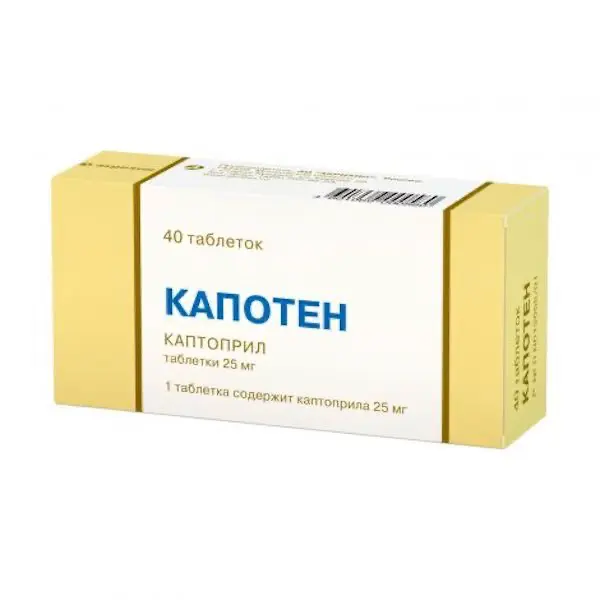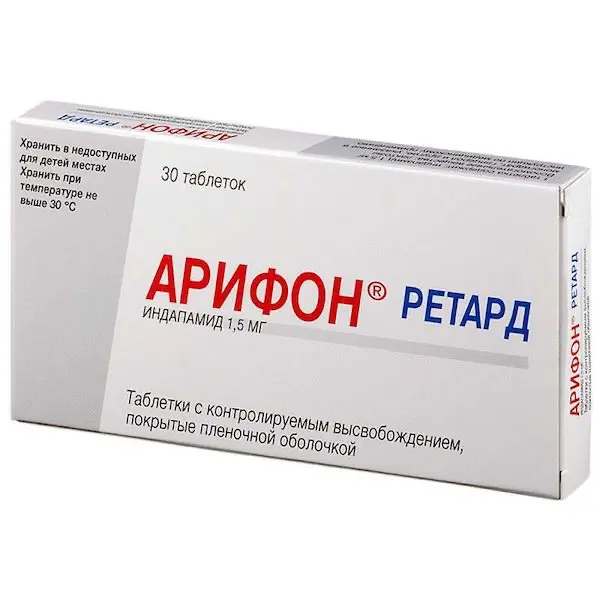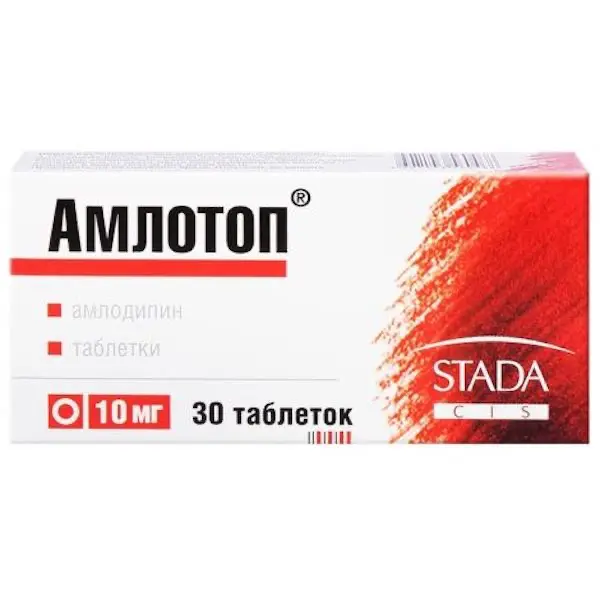Description
Capoten Pharmacodynamics
Captopril is a highly specific competitive first generation angiotensin-converting enzyme (ACE) inhibitor containing a sulfhydryl group (SH-group). It reduces the activity of the renin-angiotensin-aldosterone system (RAAS). By inhibiting ACE, captopril reduces the conversion of angiotensin I to angiotensin II and eliminates the vasoconstrictor effect of the latter on arterial and venous vessels. As a result of decreasing the concentration of angiotensin II, there is a secondary increase in plasma renin activity (due to the elimination of negative feedback) and a decrease in aldosterone secretion by the adrenal cortex. The antihypertensive effect of captopril does not depend on the activity of plasma renin. BP reduction is noted with normal and even reduced activity of the hormone, which is due to the effect on tissue RAAS.
Captopril reduces ACE-mediated degradation of bradykinin and increases its content in body tissues. As a result of ACE inhibition, circulating and tissue kallikrein-kinin system activity increases, which contributes to peripheral vasodilation by accumulation of bradykinin (a peptide with a marked vasodilatory effect) and increased synthesis of prostaglandin E2. This mechanism may contribute to the antihypertensive effect of captopril, and is also the cause of some adverse reactions (in particular, dry cough).
In patients with arterial hypertension, captopril reduces blood pressure (BP) without a compensatory increase in heart rate (HR), fluid retention, and sodium ions in the body. After a single oral administration, maximum antihypertensive effect is observed after 60-90 minutes. The degree of blood pressure reduction is the same when the patient is “standing” and “lying down”. Duration of the antihypertensive effect depends on the dose of the drug. The antihypertensive effect of captopril may increase over time and reaches optimal values after several weeks of therapy. Orthostatic hypotension develops rarely, mainly in patients with reduced circulating blood volume. Sudden discontinuation of captopril usually does not lead to the development of “withdrawal” syndrome.
In patients with arterial hypertension, captopril increases renal blood flow, while glomerular filtration rate is usually unchanged. With long-term use, it reduces left ventricular myocardial hypertrophy.
When captopril is taken sublingually in patients with uncomplicated hypertensive crisis, the onset of antihypertensive effect is observed after 10-20 minutes; the maximum antihypertensive effect is observed after 45-60 minutes.
In patients with chronic heart failure (CHF), captopril significantly decreases total peripheral vascular resistance (TPV) and increases venous volume (thereby reducing pre- and post-loading on the heart), reduces right atrial and small circulatory pressure, increases cardiac output and improves exercise tolerance.
In placebo-controlled clinical trials in patients with left ventricular dysfunction (left ventricular ejection fraction ? 40%) after myocardial infarction, captopril increased survival, delayed the development of clinically significant heart failure, and reduced the frequency of hospitalizations for heart failure.
In a clinical trial in patients with type I diabetes mellitus, diabetic nephropathy, retinopathy, and proteinuria ? 500 mg/day, captopril decreased proteinuria and reduced the rate of progression of diabetic nephropathy.
Indications
– Arterial hypertension, including renovascular (including uncomplicated hypertensive crisis);
– chronic heart failure (as part of combination therapy);
– Acute myocardial infarction: within the first 24 hours of infarction with clinically stable condition;
-left ventricular dysfunction (left ventricular ejection fraction less than or equal to 40%) after myocardial infarction in clinically stable condition to reduce the incidence of clinically significant heart failure, increase survival and reduce the rate of hospitalizations for chronic heart failure
– Diabetic nephropathy against the background of diabetes mellitus type 1 (with albuminuria more than 30 mg/day)
Contraindications
– Hypersensitivity to captopril, any other component of the drug or other ACE inhibitors;
– history of angioedema (Quincke’s edema) associated with ACE inhibitors and hereditary/idiopathic angioedema;
– Severe hepatic and/or renal impairment;
– refractory hyperkalemia;
– bilateral renal artery stenosis, artery stenosis of the single kidney with progressive azotemia;
– condition after renal transplantation;
– aortic orifice stenosis and similar changes that impede left ventricular outflow of blood;
– concomitant use with aliskiren and drugs containing aliskiren in patients with diabetes mellitus and/or moderate or severe renal function impairment (glomerular filtration rate (GFR) less than 60 ml/min/1.73 m2 body surface area);
– concomitant use with angiotensin II receptor antagonists (APA II) in patients with diabetic nephropathy;
– concomitant use with neutral endopeptidase inhibitors (e.g., drugs containing Sacubitril) due to the high risk of angioedema;
– pregnancy;
– Breast-feeding period;
– Under 18 years of age (efficacy and safety have not been established);
– lactose intolerance, lactase deficiency and glucose-galactose malabsorption syndrome.
Dosage and administration.
- Inside, an hour before a meal. Dosing regimen is set individually.
- Arterial hypertension, including renovascular
- Captopril is prescribed in an initial dose of 12.5 mg twice a day. If necessary, the dose is gradually increased (at intervals of 2-4 weeks) to achieve optimal effect.
- In mild to moderate arterial hypertension, the usual maintenance dose of captopril is 25 mg 2 times daily; the maximum dose is 50 mg 2 times daily.
- In severe arterial hypertension, the initial dose is 12.5 mg 2 times daily. The dose is gradually increased to a maximum daily dose of 150 mg (50 mg 3 times daily).
- Captopril can be used in monotherapy or in combination with other hypotensive drugs (e.g. thiazide diuretics). Captopril should be administered to patients receiving diuretics with extreme caution under medical supervision.
- In uncomplicated hypertensive crisis, sublingual administration of Capoten is possible.
- The initial dose of captopril is 25 mg (1 tablet). The tablet should be placed under the tongue and held there until completely dissolved, without swallowing or drinking water.
- After taking the drug, blood pressure and heart rate should be carefully monitored. If there is no decrease in blood pressure values within 30 minutes after taking the drug, you can take 25 mg (1 tablet) of Capotene sublingually again. The maximum dose is 50 mg (2 tablets).





